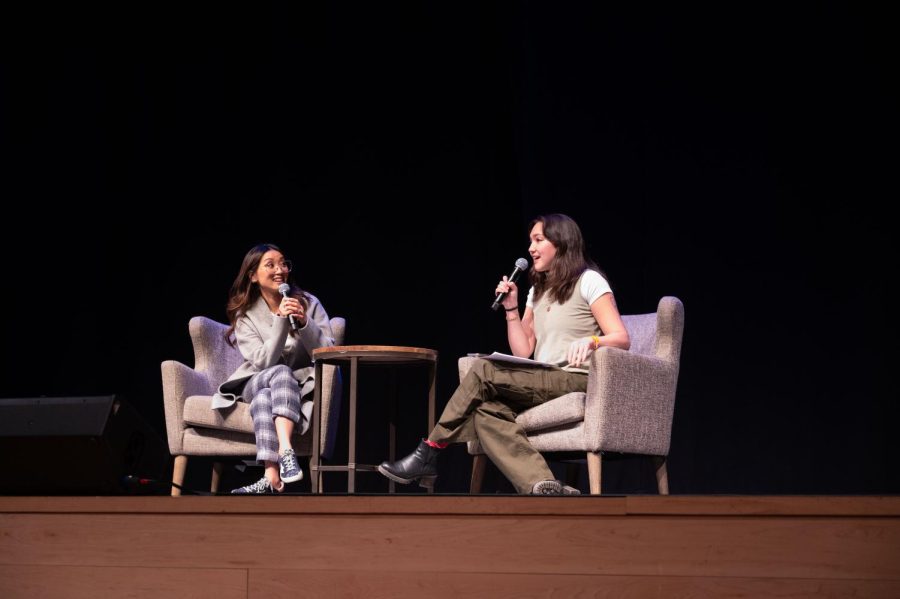Brenda Song celebrates her 35th birthday with a Q&A at Northeastern
Brenda Song speaks during a Q&A hosted in Blackman Auditorium March 27. Among other topics, Song spoke about her experiences being an Asian American actress for Disney in the early 2000s.
April 5, 2023
Best known for her infamous role as the fictional heiress of Boston — London Tipton — actress Brenda Song joined Northeastern students in Blackman Auditorium March 27 to answer hard-hitting questions about cultural identity, mental health and her skincare routine.
Song is undoubtedly one of Gen Z’s most beloved actresses, playing iconic roles in both “Suite Life” iterations, “Wendy Wu: Homecoming Warrior” and “Dollface.” She recently shared the news of her and fiance Macaulay Culkin welcoming a second baby. Song has raised children in more ways than one — the new mother of two took the hour-long Q&A to share advice for the generation who grew up watching her onscreen.
The overarching theme of the event was: “facts about Brenda Song that will shock you.” The audience learned that Song has a black belt in taekwondo, she rejected an admission offer from Harvard University and she chose to celebrate her 35th birthday at Northeastern — although this last fact was surprising to herself as well.
“I’m at that age now where I didn’t even realize it was my birthday,” Song told the audience.
The event was moderated by Rachel Young, a second-year communications major and design coordinator of Northeastern Council of University Programs, or CUP. The organization, along with the Resident Student Association, or RSA, hosted the event, which has been in the works since the end of last semester.
Days before the event, Young set her affirmations in stone.
“I’m manifesting that it’s going to go well,” she said.
And it did.
Song attracted nostalgic Disney-loving students from across campus to cheer her on during the Q&A. Some students who have not seen much of Song’s work, such as Stephanie Son, a second-year sociology major, attended anyway. She admired Song as a role model for the Asian American community among Gen Z.
“There’s a pretty tight-knit Asian American community here,” Son said. “It’s kind of cool that it’s more of a bigger experience for everyone that goes to Northeastern to be able to see her.”
During the Q&A, Song expressed her gratitude for her role as London Tipton, describing her as her “fantasy character.” Based not-so-loosely on Paris Hilton, Tipton was an “airhead” character that embodied confidence and was the blueprint for Y2K fashion — and for that, Hilton has never been offended by the character, Song clarified.
As a first-generation Asian American, Young’s admiration for Song began with the “rambunctious” character of Tipton, she said. Growing up in a rural town in New Jersey, Young connected with Song as she watched her through various shows and movies in her childhood.
“To see how successful she is and how impactful she’s been on not only my childhood but millions of other people across the country has been awesome,” Young said.
Even those who could not relate to this level of connection recognized Song’s impact as one of the only non-white actors who played big roles on Disney in the early 2000s. Alexandra Osuji, a third-year criminal justice and psychology combined major, attended the event as a veteran “Suite Life” fan.
“She is definitely a great representation in stuff that I have seen her in,” Osuji said.
Despite being a role model for many Asian Americans, Song also struggled with her cultural identity. As someone who is Thai and Hmong, Song would feel like an “outcast” from time to time, as she was usually the only Asian American in her friend groups. During her time at Disney, she felt her cultural background was typically an “unspoken elephant in the room.” But Song learned to embrace her culture. However, this could have been more easily achieved if there were more Asian actors on TV growing up, she said.
“For the first time in a long time, media is finally starting to reflect what the world looks like,” Song said. “The more people see how colorful the world is on TV, the more accepting they are in real life. It’s really sad but [it’s] the truth.”
Along with discussions about identity, Song shared her struggles with mental health after her days on Disney. Having been in the acting industry since she was a toddler, Song had an identity crisis, which noticeably began when she cried at an IHOP over her eggs — she didn’t know how she liked her eggs. If she couldn’t decide between something as simple as scrambled, fried or over-easy eggs, how could she decide which path to take in her career?
“I just didn’t know what I wanted to do,” Song said. “Disney gives you such a specific identity [and] you can get wrapped up in it all the time. You don’t know who you are. I stepped into someone else’s shoes everyday.”
Song felt like she walked around with “Mickey ears” for most of her career. And it didn’t help when people in her life told her to book more “edgy” roles to enter the “adult world” of acting.
“I had never [even] gone to a house party,” Song said. “The first time I saw weed I thought it was potpourri.”
In the second half of the event, Song discussed what she has learned in the adult world. In the mess of figuring out who she wants to be, there is one thing Song is certain about: her skincare routine.
“Drink water. Wash your face. Keep it simple,” she said.
Even if college students forget to keep up with the steps of Song’s skincare routine, she reminded the audience that there is still time to figure things out before entering the adult world.
“Make mistakes,” Song said. “That’s what your 20s are for.”







